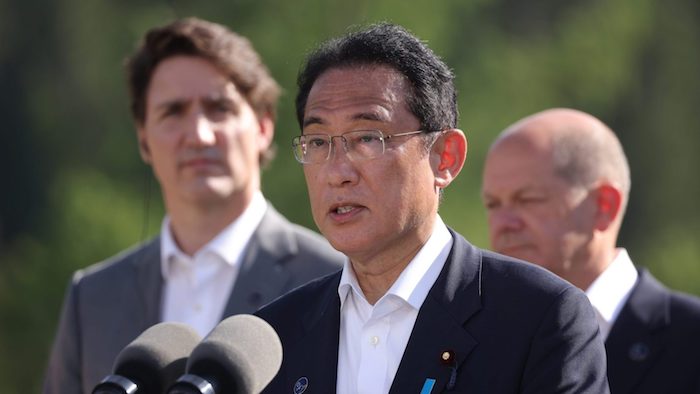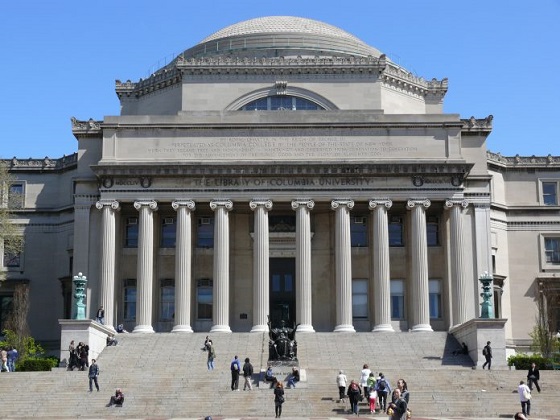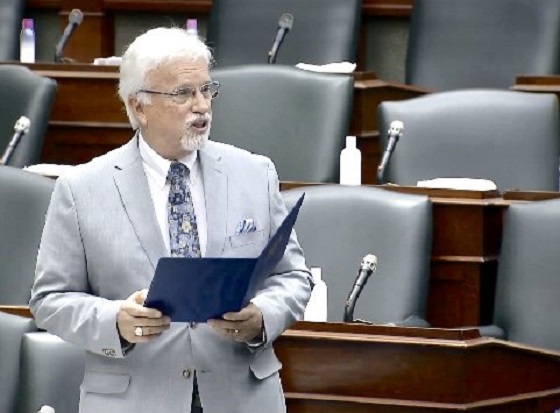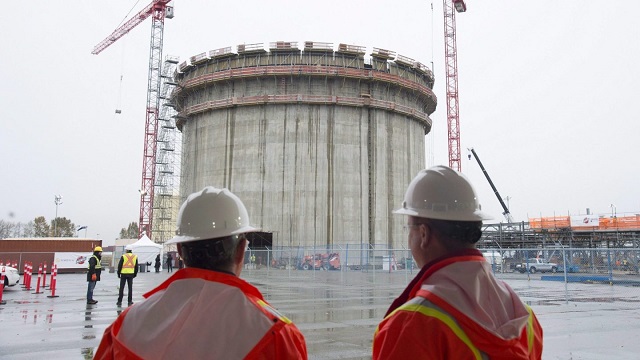Alberta
Japan PM sees LNG Canada as a ‘flagship’ facility to help improve world energy security while lowering emissions

Prime Minister of Japan Fumio Kishida speaks during the G7 summit at Schloss Elmau, Germany on June 26, 2022 as (L-R) Canadian Prime Minister Justin Trudeau and German Chancellor Olaf Schulz look on. Getty Images photo
From the Canadian Energy Centre Ltd.
Kishida is expected to ask for Canadian LNG as the country looks to replace Russian gas supplies
Japanese Prime Minister Fumio Kishida sees the LNG Canada terminal under construction at Kitimat, B.C. as a “flagship” facility, he said in remarks Jan. 12 during a visit to Ottawa to meet with Prime Minster Justin Trudeau.
“LNG will indeed play a crucial role in striking a balance between energy security and decarbonization,” he said.
“LNG Canada is a flagship project making maximum use of the latest technologies of Japanese companies.”
Resource-poor Japan is the world’s largest LNG consumer, using the fuel to generate electricity, power industry, and heat homes and businesses. Qatar is one of Japan’s largest LNG suppliers.
Kishida is expected to ask for Canadian LNG as the country looks to replace Russian gas supplies. Japan, a relatively short distance from the LNG Canada project compared to terminals on the U.S. Gulf Coast, imported nearly 75 million tonnes of LNG in 2020 – worth over $30 billion.
Kishida’s visit comes just months after German Chancellor Olaf Scholz visited Ottawa also seeking Canadian LNG. Prime Minister Trudeau questioned the business case for shipping Canadian LNG to Europe.
Germany, moving swiftly to reduce reliance on natural gas flows from Russia, built an LNG import facility in just 194 days and recently received its first shipment from the U.S. It also signed an agreement with Qatar to receive 2 million tonnes of LNG per year for 15 years starting in 2026. Germany will open a second LNG import terminal in January.
While Canadian LNG can help alleviate the challenge in Europe, the larger long-term opportunity is in Asia, according to energy consultancy Wood Mackenzie.

Module delivery, LNG Canada site, Kitimat, B.C., July 2022. Photo courtesy LNG Canada
“For Asian buyers, Canadian LNG is quite cost competitive due to its relatively low shipping and liquefaction costs compared to other global exporters,” says Dulles Wang, Wood Mackenzie’s director of Americas gas and LNG research.
As of July 2022, Japan had 92 operating coal plants, 6 under construction and 1 in pre-construction, says Global Energy Monitor. Construction of new coal-fired power plants is occurring mostly in Asia, with China accounting for 52 per cent of the 176 gigawatts of coal capacity being built in 20 countries in 2021, says a New Scientist report.
“If Canada increases its LNG export capacity to Asia, net emissions could decline by 188 million tonnes of CO2 equivalent per year through 2050 – or the impact every year of taking 41 million cars off the road,” according to Wood Mackenzie analysis.
Asia drives 67 per cent of global LNG demand today, and that share is expected to grow to 73 per cent by 2050 as world consumption doubles to 700 million tonnes per year.
“Starting in 2027, we see there’s going to be a global supply/demand gap that is probably going to grow to 120 million tonnes per annum and about 150 million tonnes per annum by 2035,” says Matthias Bloennigen, Wood Mackenzie’s director of Americas upstream consulting.
“Developing western Canadian LNG would be helpful to alleviate the LNG demand that’s going to develop in the world.”
The unaltered reproduction of this content is free of charge with attribution to Canadian Energy Centre Ltd.
Alberta
Official statement from Premier Danielle Smith and Energy Minister Brian Jean on the start-up of the Trans Mountain Pipeline

Alberta
Protecting the right to vote for Canadian citizens: Minister McIver

Minister of Municipal Affairs Ric McIver issued the following statement in response to Calgary City Council’s vote to extend the right to vote to permanent residents:
“Yesterday, Calgary city council passed a motion advocating for permanent residents to be extended the right to vote in civic elections. Alberta’s government has been clear since the beginning: only Canadian citizens are able to vote in civic elections. That will not be changing.
“The Canadian Charter of Rights and Freedoms affirms the right of every Canadian citizen to vote and to run as a candidate. This right extends to voters in municipal, provincial and federal elections.
“Protecting our democracy is of the utmost importance. Our provincial election legislation, like the Local Authorities Elections Act, has also been clear since its inception that voting is a right of Canadian citizens.
“Alberta’s government is also ensuring that voting is accessible for more Albertans. The Municipal Affairs Statutes Amendment Act proposes to enable special ballot access for any voter who requests it, without having to provide any specific reason such as physical disability, absence from the municipality or working for the municipal election. The ministries of Seniors, Community and Social Services and Service Alberta and Red Tape Reduction are also making it easier for individuals to obtain the identification Albertans need for a variety of services, including the ability to cast a ballot.
“Our government will continue to protect the integrity of our elections and make sure voting is accessible for all Albertans who are Canadian citizens.”
-

 COVID-192 days ago
COVID-192 days agoPeckford: Hallelujah! Supreme Court of Canada to hear Newfoundland and Labrador charter case
-

 Alberta1 day ago
Alberta1 day agoThree Calgary massage parlours linked to human trafficking investigation
-

 Uncategorized1 day ago
Uncategorized1 day agoMaking Alberta a geothermal energy leader
-

 Alberta2 days ago
Alberta2 days agoCanada’s postal service refuses to help with Trudeau’s gun ban buyback program: report
-

 Alberta1 day ago
Alberta1 day agoAlberta’s vision for passenger rail
-

 conflict17 hours ago
conflict17 hours agoColumbia on Lockdown After pro-Palestinian Protesters Take Over Building, Hold Janitors Hostage
-

 COVID-192 days ago
COVID-192 days agoFormer Canadian lawmaker has no regrets about refusing COVID shot despite losing his job
-

 Canadian Energy Centre17 hours ago
Canadian Energy Centre17 hours agoNorth America LNG project cost competitiveness








